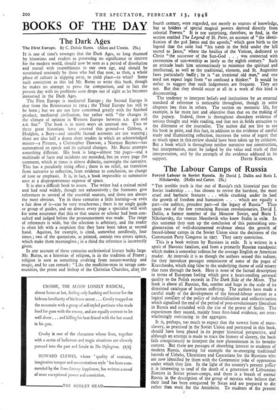The Labour Camps of Russia
Forced Labour in Soviet Russia. By David J. Dallin and Boris I. Nikolaevsky. (Hollis and Carter. 25s.)
"THE terrible truth is that out of Russia's rich historical past the Soviet leadership . . . has chosen to revive the harshest, the most cruel and barbaric features . . . while crushing under its heel the growth of freedom and humanism . . . which are equally a partāthe noblest, proudest partāof the legacy of Russia." Thus speak two of the few remaining Russian revolutionaries, David J. Dallin, a former member of the Moscow Soviet, and Boris I. Nikolaevsky, the veteran Menshevik who knew Stalin in exile. In this sentence they sum up the conclusion of this painstaking con- glomeration of well-documented evidence about the growth of forced-labour camps in the Soviet Union since the decisions of the Communist Party Congress in 1927. They carry conviction.
This is a book written by Russians in exile. It is written in a spirit of Slavonic fatalism and from a primarily Russian standpoint which makes it somewhat tedious for the average English or American reader. At intervals it is as though the authors sensed this tedium, for they introduce passages reminiscent of some of the pages of Kravchenko which-ring false to the underlying theme of cold misery that runs through the book. Here is none-of the factual description in terms of European feeling which gave a heart-rending personal quality to the Polish records in The Dark Side of the Moon. The book is above all Russian, flat, sombre and huge in the scale of its disjointed catalogue of human suffering. The authors have made a careful study of the development of the forced-labour system as a logical corollary of the policy of industrialisation and collectivisation which signalised the end of the period of post-revolutionary liberalism in Russia and coincided with the rise of the power of Stalin. The experiences they record, mainly from first-hand evidence, are over- whelmingly convincing in the aggregate.
It is, perhaps, too much to expect that the newest form of mass- slavery, as practised in the Soviet Union and portrayed in this book, should have been placed in its proper historical perspective, and although an attempt is made to trace the history of slavery, the book fails conspicuously to interpret the new phenomenon in its broader context. But there are passages of absorbing interest to students of modern Russia, showing for example the re-emerging traditional hatreds of Uzbeks, Ukrainians and Caucasians for the Russians who are now identified by them with the Communist yoke of oppression under which they lixe. In the light of the country's present policy it is interesting to -toad of the death of a generation of Lithuanian Zionists in Soviet prison-camps, and there is a breath of eternal Russia in the description of the group of mystics who believe that their land has been conquered by Satan and are prepared to die rather than work for the Antichrist. To students of the present
trends of international politics the account of the effects of the murder of Kirov in 1934 throws an interesting light on the activities of Andrei Vishinsky before he turned his talents to the problems of Soviet foreign affairs.
This book is pervaded by the numb tragedy of perhaps fifteen million souls, spread over the most desolate parts of Russia, existing on that Marxian minimum of clothing, food and rest which is necessary if the Soviet State is to have its proper economic return from the human working-machine. It is, in the words of the authors, "the old slavery plus a new system of incentives, among which the strongest is the urge to stay alive." The tragedy is a Russian one, a tragedy of vast spaces and endless human suffering barely conceivable in the temperate mental atmosphere of an island with a parliamentary tradition. The personalities of Dostoievsky's Russians emerge unmistakably from the descriptive passages which recur throughout the book. In Boris Nikolaevsky's dreadful chapter 6 the reader may recognise Dmitri and Alexei Karamazov shivering in their squalid misery in a hut on the banks of the Kolyma after a long day's labour in the gold-mines, while in the adjoining administra- tion building their brother, Ivan, bites his nails as he adjusts and re-adjusts the figures of camp production to satisfy the regional commandant of the Ministry of Internal Affairs.
Hardly a popular book, but an important, authoritative and well- documented text-book on one of the more important social phenomena



































 Previous page
Previous page